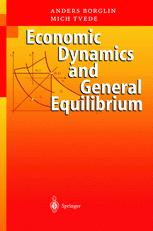

Most ebook files are in PDF format, so you can easily read them using various software such as Foxit Reader or directly on the Google Chrome browser.
Some ebook files are released by publishers in other formats such as .awz, .mobi, .epub, .fb2, etc. You may need to install specific software to read these formats on mobile/PC, such as Calibre.
Please read the tutorial at this link: https://ebookbell.com/faq
We offer FREE conversion to the popular formats you request; however, this may take some time. Therefore, right after payment, please email us, and we will try to provide the service as quickly as possible.
For some exceptional file formats or broken links (if any), please refrain from opening any disputes. Instead, email us first, and we will try to assist within a maximum of 6 hours.
EbookBell Team

4.8
64 reviewsThis book grew out of the teaching and lecture notes for a course in "Dynamic Economics" given at Copenhagen University where it has been part of a combined study program in economics and mathematics since 1986. The subjects in the course have varied over time but a common theme has been the study of economies over time and under uncertainty in the form of incomplete markets and the overlapping generations model. When I took up a position at Lund University in 1996 Mich Tvede took over responsibility for the course and together we developed a large part of the material, which formed the basis for the present book. He has generously allowed me to use all of our common material. There is a considerable overlap between general equilibrium theory with incomplete markets (GEI), finance and macroeconomic theory, which sterns from the considerations of time and uncertainty, as can be seen from the splendid textbooks by LeRoy and Werner [2001], Pliska [1997] and the seminal work on GEI by Magill and Quinzee [1996], in partic ular its "Historical Remarks" which off er a brilliant history of modern economic theory. The exposition here airns at making some of the results of GEI and on overlapping generations (OG) economies readily available to areader acquainted with economic theory at an upper undergraduate level.